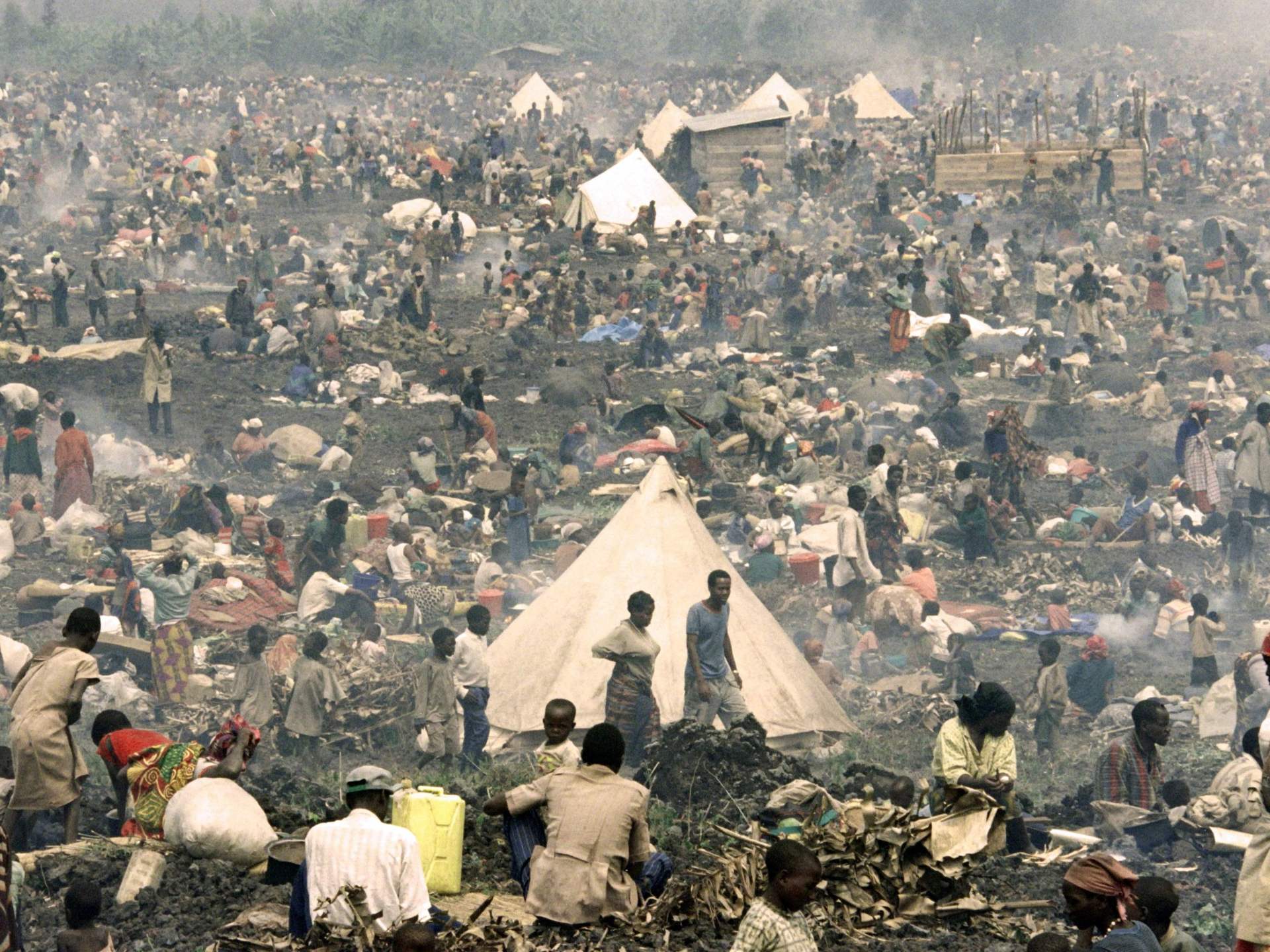Tens of thousands of Rwandans gather in 1994 in temporary tents in the border city of Goma to escape massacres (French - archive)
Next Sunday, Rwanda will begin commemorating the 30th anniversary of the genocide that it witnessed in 1994 and was carried out by Hutu extremists against the Tutsi minority over a period of 100 bloody days, during which more than 800,000 men, women and children were killed, most of whom were Tutsis.
In addition to the Tutsi victims, a number of moderate Hutus were also killed in massacres in which family members and friends turned against each other, in one of the darkest chapters of history in the late twentieth century.
Three decades later, the small country has rebuilt itself under President Paul Kagame's dictatorial rule, but the shocking legacy of genocide still reverberates across the region.
In keeping with tradition, April 7 - the day Hutu extremists and militias launched their horrific killing campaign in 1994 - will be commemorated by Kagame lighting the remembrance torch at the Kigali Genocide Memorial, where more than 250,000 victims are believed to be buried.
Kagame, whose rebel army, the Rwanda Patriotic Front, helped stop the massacres, will deliver a speech on this occasion, and will lay wreaths on mass graves, while some foreign dignitaries will attend what he called “Kibuka,” which means commemorating the 30th anniversary.
A photo of Zairian soldiers on July 18, 1994 standing on the border in the eastern town of Goma in front of piles of weapons confiscated from the forces of the ousted Rwandan government (French)
It will not be repeated
The ceremony scheduled for Sunday marks the start of the national week of mourning when everything in Rwanda will stop and flags will be flown at half-mast. During those days, music will not be allowed to be played in public places or on the radio, and televisions will be prohibited from broadcasting sporting events and films, unless they are related to commemoration ceremonies.
Ceremonies will also be held on this occasion at the United Nations, the African Union and others. United Nations Secretary-General Antonio Guterres said in a message on the occasion of the anniversary, “This year, we remind ourselves of the rotten roots of genocide: hatred,” adding, “And to those who seek to divide us, we must deliver a clear, unequivocal and urgent message... It will not happen again.”
It is noteworthy that the international community faced severe criticism for its failure to protect civilians, and the United Nations reduced the number of its peacekeeping forces shortly after the outbreak of violence.
A soldier from the National Front carries an ammunition box on the front line in Gitirama during the days of the bloody genocide (French)
Shooting, beating or stabbing to death
The assassination of Hutu President Juvenal Habyarimana on the night of April 6, 1994, when his plane was shot down over Kigali, sparked a wave of anger among Hutu extremists and the Interahamwe militia, whose victims were shot, beaten, or stabbed to death, in killings fueled by the anti-Hutu propaganda campaign. for the Tutsis that were broadcast on television and radio.
According to United Nations figures, it is estimated that between 100,000 and 250,000 women were raped, and hundreds of thousands of people, most of them ethnic Hutus who felt fear of revenge attacks following the genocide, fled to neighboring countries, including the Democratic Republic of the Congo. Mass graves are still being discovered in Rwanda today.
In 2002, Rwanda established native courts where victims could hear "confessions" of those who had persecuted them. Over the course of 10 years, 1.2 million cases were heard, although human rights organizations believed that the system also led to a miscarriage of justice, as some complainants used it to settle scores.
Today, Rwandan identity cards no longer state whether a person is Hutu or Tutsi. High school students learn about genocide within a tightly controlled curriculum.
A visitor looks at a photo of a victim at the Genocide Memorial in Kigali (French - archive)
Scars of the past
About two-thirds of Rwanda's population was born after the genocide. Many are seeking to help reshape their country's painful history and create a new narrative. Project manager Roxanne Mudenge (27 years old) said, “Since I was a child, the story of Rwanda has been a story of rebuilding, and the scars of the past still remain, but there is a different energy now, a sense of possibility.”
Rwandan authorities report that hundreds of genocide suspects remain at large, including in neighboring Democratic Republic of the Congo and Uganda. So far, only 28 have been delivered to Rwanda globally.
France - one of the most prominent destinations for Rwandans fleeing justice in their country - tried and convicted about 5 people on the basis of their involvement in the killings, and France was at the time one of the most important countries supporting Habyarimana, which led to decades of tension between the two countries.
In 2021, French President Emmanuel Macron acknowledged his country's role in the genocide and its refusal to respond to warnings of future massacres, which prompted Kagame to praise the French president for taking a "big step."
Although Macron did not go so far as to apologize and denied any French complicity in the killings, Kagame said that rapprochement would pave the way for a “better” relationship between the two countries.
On the other hand, Kigali has a hostile relationship with Kinshasa, as the Rwandan Patriotic Front was accused of killing tens of thousands of civilians while pursuing the perpetrators of the genocide in the Congo.
Kagame's government was accused of arming the Tutsi-led M23 rebels in the eastern Democratic Republic of the Congo. Kigali denied the accusations but stated that the Tutsis in its larger neighbor were victims of persecution.
Source: French

